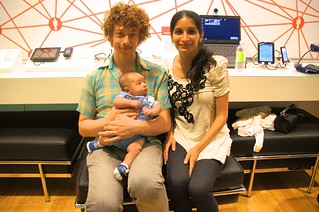Losing the Signal
The Untold Story Behind the Extraordinary Rise and Spectacular Fall of BlackBerry
by Jacquie McNish, Sean Silcoff (Overdrive) – (Amazon.com)![]()
Blackberry had me for so long, and it could have had me and others for so much longer…
In fact, as I now remember it, I was so eager to get on a newer handheld device without the alleged legacy of Blackberry once that I petitioned to try out a Palm Treo 650, with email powered by Good Technology. I didn’t know until reading this book that Good was “quietly” backed by the cell carriers, which makes sense, because the trial was a disaster. I went right back to Blackberry. Why? Because it was reliable, and that’s what was needed to get work done for our members. Ironically, Good was just purchased by Blackberry itself.
Other reviews of the book mention it as not being thrilling except to people who are interested in the evolution of the mobile phone. So I guess I’m interested in the evolution of the mobile phone. I actually remember the day I received a Blackberry for the first time – the reaction isn’t that unique compared to what’s written in the book, so I won’t repeat it.
The book does a good job describing how a great idea became not so great anymore, and lays out, interestingly, what Clay Christensen did in his book, which I also just read, which he calls “The destructive power of marginal thinking,” (which I’ll blog on in a bit):
As Henry Ford once put it, “If you need a machine and don’t buy it, then you will ultimately find that you have paid for it and don’t have it.”
Christensen, Clayton M.; Allworth, James; Dillon, Karen (2012-05-15). How Will You Measure Your Life? (p. 185). HarperCollins. Kindle Edition.
Of course easy to diagnose in retrospect.
It’s a little hard to believe that the team at Research in Motion didn’t know about iPhone until the day it was announced. Rumors were swirling for months if not years.
So much good will built up
I was also unaware of the impact of the NTP patent lawsuit. I remember when that was going on too, and the sentiment to an extent was – we hope Blackberry can recover because the service is so valuable. Even then they had built up a tremendous bank of good will.
When Apple came out with its first mobile phone, there was zero chance for me that I would consider Blackberry as a device – for personal use. Work use was another matter. To this day I gently complain about the ability to type on an iPhone keyboard – still looking for that right app. Email is pretty reliable on an iPhone these days, but in the early days, it was most definitely not.

When the Kaiser Permanente Center for Total Health (@KPTotalHealth) opened in 2011, believe it or not, it actually had a Blackberry (RIM) Playbook on display. There aren’t many photos of it except for this one, which tells you how well it was received. However, it’s a sign that there was still good will, even in 2011.
I was first given the opportunity to beta-test an iOS device in the work environment, it was, again, saddled with email powered by Good Technology, and brought me right back to Blackberry – the reliability thing. I would have thought that given the superiority of the RIM solution (mostly), that they would pivot to embrace the iOS wave and bring enterprise class email to every device. Same thing for BBM. From reading the book, it looks like they almost did for both…. Eventually, though, the Blackberry stopped being supported, and iOS is now the standard, with a mobile email management solution that Blackberry could have owned.
What we lost: still bummed about Tungle
Beyond the innovative spirit of the leaders of RIM, which was clearly battered from all sides (just look at the headlines on one Apple-centric blog over the past 8 years), other useful technology was swallowed in the quest for recovery.
Tungle.me was a most innovative social scheduling system. It did what so many products didn’t do, integrate with multiple email systems, making it easy to give a person or group a window of time to meet and manage all the details. A more functional version of Doodle, and much more automated. Now it exists only as a Twitter sarcophagus. The innovation didn’t continue.
The innovation continues! Tungle sunsets Dec 3 but the vision will live on thru #BlackBerry10. @BlackBerry for updates http://t.co/en3jI1bB
— Tungle Rocks (@Tunglerocks) September 18, 2012
What this says to me is that there’s no guarantee that the best technology or product or idea will continue to evolve because it’s the best.
The story told here is the almost exact opposite of the Steve Jobs story, and honestly, how do we know that the narrative couldn’t have flipped in favor of the struggling Canadian behemoth rather than the struggling Cupertino one.
I’m sure there are many leadership lessons in both. I appreciate that both CEOs Balsillie And Lazaridis sat for interviews with the authors so that others might learn. Not all was lost.
The Future
And now it looks like Blackberry is actually doing it, bringing an Android phone to market with reliable/secure email and a keyboard. I think they have a shot, with a little humility, and focus on what the customer wants, they could do well. And why shouldn’t they, there’s a sense among the reviewers that the story has played out, but no story is ever over.


1 Comment
Just+Read:+The+Untold+Story+Behind+the+Extraordinary+Rise+and+Spectacular+Fall+of+BlackBerry https://t.co/g9gWnwar9m